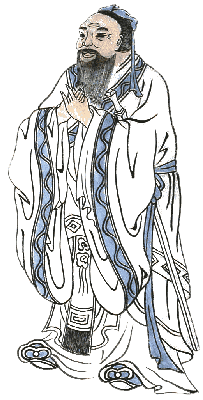
Menicus and the The Book of Analects

Menicus and the The Book of Analects
After the death of Confucius, his former students and disciples gathered
together and decided to assemble all the sayings of their teacher which they
could remember, as a memorial to his name and as a record of his methods of
teaching; his Doctrines of the Middle path; and his ideas of government. They
looked upon their Great teacher as an educator and a statesman, a philosopher
and a traditionalist, and as such they recorded him, to keep his memory and his
ideas alive. In the discourses with his disciples Confucius never discussed
religion. He taught them ethics, and these ethical teachings his disciples
recorded as faithfully as they could. Though his disciples and their successors
kept the memory of Confucius alive among themselves, his fame slowly began to
wane among the people generally.
Then a century after the Great Teacher died, a child was born in the same
provinces that had been the birthplace of Confucius, and he was named Mang. At
an early age Mang showed an aptitude for mimicry.
According to legend, one day his widowed mother, who lived near a cemetery,
found her son mingling with the mourners and imitating the scenes he witnessed.
"This is no place for my son," said his mother. And she moved to a house near a
market place. But soon she found little Mang running among the market stalls and
mimicking the hawkers and their customers. "This is no place for my son," said
his mother. And she moved near school. Before long little Mang was imitating the
scholars and practicing politeness. And there the mother decided to remain.
Very early in his life Mang became interested in the teachings of Confucius. He
set himself to the task of reviving an interest in them, and gathered about him
many students to whom he taught the wisdom of the Great Teacher. The students
began to call Mang, Mang the Philosopher (Mang-tze), from which we get the name
Menicus.
Menicus was a good organizer and proselytizer. Wherever he went he made
converts. He gathered the discourses and sayings of Confucius as recorded by the
disciples, and organized them into books, the best-known of which is The Book of
Analects . He went out among the people to teach the essential goodness of man's
nature, as taught by Confucius. But the teachings had already assumed a
religious nature, and Confucius began to be regarded as the Teacher of a new
religion.
The people were taught six principles:
1] Human Nature is good; and evil is essentially unnatural.
2] Man is free to conduct himself as he wills, and he is the master of his choice.
3] Virtue is its own reward. If one does good for a reward, or avoids evil for fear of punishment - that is not virtue.
4] The rule for individual behaviour is: What you do not want others to do to you, do not do to them.
5] A man has five duties: to his ruler, to his father, to his wife, to his elder brother, and to his friend. And the most important of these is the filial duty.
6] Man should strive to become a superior man. When the rulers of the
Empire asked Menicus for the essentials of his teachings, he would reply: "What
I teach is nothing new. The Master Confucius taught it before me. A just ruler
governs his people according to the Five Constant Virtues. And these are:
Benevolence, which is always to think first of what is good for
the people;
Righteousness, which is not to do to your subjects what you would
not want them to do to you if you were in their place;
Propriety, which is always to behave with courtesy and respect
toward your subjects;
Wisdom, which is to be guided by knowledge and understanding; and
Sincerity, which is to be sincere and truthful in all you do." The
fame of Confucius grew greater in the land than at any time when the Great
Teacher had been alive. And he became widely known as the First Sage of China,
Menicus is remembered as the Second Sage of China.
About a hundred and fifty years following the death of Menicus, the new Emporer
of China, who was a young boy, became enraged by the teachings of Confucius as
taught by his disciple Menicus. He ordered all his books burned and all the
scholars who knew these books orally to be driven out of the country.
The people, however, loved the teachings of Confucius and they kept his memory
alive in their hearts. As soon as the Emporer died, the eminence of the First
Sage became greater than ever. Sacrifices were offered in his memory, and his
works were canonized. Later he was given the rank of an earl, and still later
this was raised to the rank of an emperor. The people began to venerate and
worship him as a god. Temples were built where he could be worshiped. And
Confucianism became a religion.
Source:
"Socrates, Buddha, Confucius, Jesus: From The Great Philosophers,Volume 1",
Jaspers, Karl. pgs.41-63. Copyright 1957 by R. Piper and Co. Verlag, Munchen.

The Man Wisdom Analects Maxims Home